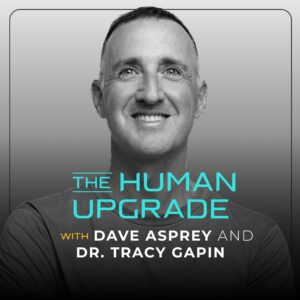Cardiovascular health is a cornerstone of overall well-being, yet it often flies under the radar in discussions about men's health. Dr. Tracy Gapin, a board-certified urologist and men's health optimization expert, sheds light on this critical topic, emphasizing the importance of understanding various health markers and adopting a holistic approach to health. Listen to this episode!
From Traditional Urology to Holistic Health
Dr. Gapin's journey from traditional urology to a more comprehensive, holistic approach to men's health is both inspiring and enlightening. In his practice, he has seen firsthand how traditional methods sometimes fall short in uncovering hidden health issues. By integrating functional testing and advanced diagnostics, Dr. Gapin aims to provide a more complete picture of a man's health, particularly when it comes to cardiovascular disease.
The Role of Hormonal Health
One of the often-overlooked aspects of cardiovascular health is hormonal balance. Hormones like testosterone and DHEA play a significant role in maintaining heart health. Low levels of these hormones can lead to a myriad of health problems, including cardiovascular disease. Dr. Gapin stresses the importance of regular hormonal health checks to ensure that these critical markers are within healthy ranges.
Gut Health: The Unsung Hero
Gut health is another crucial factor in cardiovascular health. The gut is responsible for more than just digestion; it affects mood, metabolism, and immune response. An unhealthy gut can lead to inflammation, which is a known risk factor for cardiovascular disease. Dr. Gapin highlights the need for a balanced diet rich in fiber, probiotics, and prebiotics to maintain gut health and, by extension, cardiovascular health.
The Interconnection of Stress, Sleep, and Gut Health
Stress and poor sleep are often silent killers, contributing significantly to cardiovascular problems. Chronic stress can lead to elevated blood pressure and heart rate, while poor sleep can disrupt hormonal balance and gut health. Dr. Gapin points out that managing stress through mindfulness practices and ensuring good sleep hygiene are essential steps in maintaining cardiovascular health.
The Potential of Peptides and Advanced Diagnostics
Modern medicine offers exciting advancements in the form of peptides and advanced diagnostics. Peptides can help in various ways, from improving hormonal balance to enhancing overall vitality. Advanced diagnostics, on the other hand, provide a more detailed understanding of an individual's health, allowing for personalized treatment plans. Dr. Gapin believes that these tools are invaluable in optimizing cardiovascular health.
Practical Steps for Better Health
Improving cardiovascular health doesn't require drastic changes. Dr. Gapin recommends practical, actionable steps that individuals can take right away:
- Nutrition: Focus on a balanced diet rich in fruits, vegetables, lean proteins, and healthy fats. Avoid processed foods and excessive sugar intake.
- Hydration: Drink plenty of water throughout the day to keep your body hydrated and support metabolic functions.
- Sleep Hygiene: Establish a regular sleep routine, create a comfortable sleep environment, and avoid screens before bedtime.
- Stress Management: Incorporate mindfulness practices such as meditation, yoga, or deep-breathing exercises into your daily routine.
In conclusion, cardiovascular health is a multifaceted issue that requires a holistic approach. By understanding the interconnectedness of hormonal health, gut health, stress, and sleep, and by leveraging modern medical advancements, men can take proactive steps to optimize their cardiovascular health. Dr. Tracy Gapin's insights provide a valuable roadmap for anyone looking to improve their overall well-being. Start your journey with us today!








